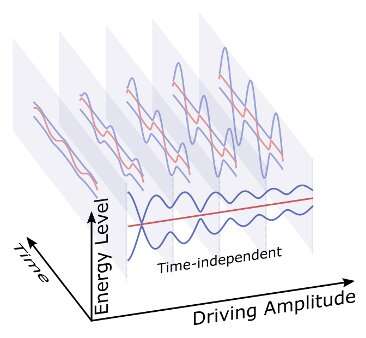This article has been reviewed according to Science X's editorial process and policies. Editors have highlighted the following attributes while ensuring the content's credibility:
fact-checked
proofread
New scheme for qubit control in a multilevel system

A team led by Prof. Guo Guangcan from the University of Science and Technology of China (USTC) has made significant progress in the research of multilevel quantum system tunability.
Collaborating with Professor Hu Xuedong from the University at Buffalo, State University of New York, and Origin Quantum Computing Company Limited, Professors Guo Guoping, Li Haiou and Gong Ming proposed a new type of quantum gates that can achieve noise-resistant qubit control by tuning the parameters of the driving field. Their work was published in Physical Review Applied.
Quantum state manipulation is widely applied in quantum system like superconducting qubits and semiconductor quantum dots. A quantum system with simple energy levels is easy to manipulate, but interferences may occur in a more complicated multilevel system. For example, a two-qubit semiconductor spin system has a theoretical model of five energy levels.
When driving such a system, different coherent processes within the system interfere with each other, making it difficult to analyze and control the evolution process. Currently, related research is mostly limited to various approximate conditions, which are unfavorable for further development of qubit manipulation.
In order to study the effects of driving fields on multilevel systems, previous work has often relied on numerical simulations or reduced multi-level systems to two-level systems. However, these methods cannot comprehensively describe the complex phenomena in the experiments. Therefore, finding a suitable reference frame (or basis vector) can greatly simplify the problem.
In this work, researchers coupled a shuttle state with all the other energy levels and achieved equivalent coupling between any two energy levels by tuning the amplitude and frequency of the shuttle state. This is possible because the effective model of their Floquet engineering can achieve any desired equivalent model by tuning these parameters.
The results show that within the experimental parameter range, this approach can implement a wide range of couplings while maintaining high control speed. Using this method, the researchers theoretically demonstrated single-qubit and two-qubit gate operations with fidelities exceeding 99%. This model can even interpret some previously unexplained novel odd-even effects observed in experiments.
In this scheme, the shuttle state plays a crucial role. It not only enables effective coupling between any two energy levels but also serves as a means of measurement. Researchers can conduct non-destructive measurements of quantum states by measuring the shuttle state.
This theoretical proposal has significant applications, as the multi-energy level systems discussed in this study are found in almost all other physical systems, including atoms, ions, and superconducting qubits.
By making appropriate improvements to the scheme and selecting suitable parameters, arbitrary gate control can be realized in other models. This new scheme provided fresh experimental insights for quantum gate operations in multi-level systems.
More information: Yuan Zhou et al, Full Tunability and Quantum Coherent Dynamics of a Driven Multilevel System, Physical Review Applied (2023). DOI: 10.1103/PhysRevApplied.19.044053
Provided by University of Science and Technology of China





















